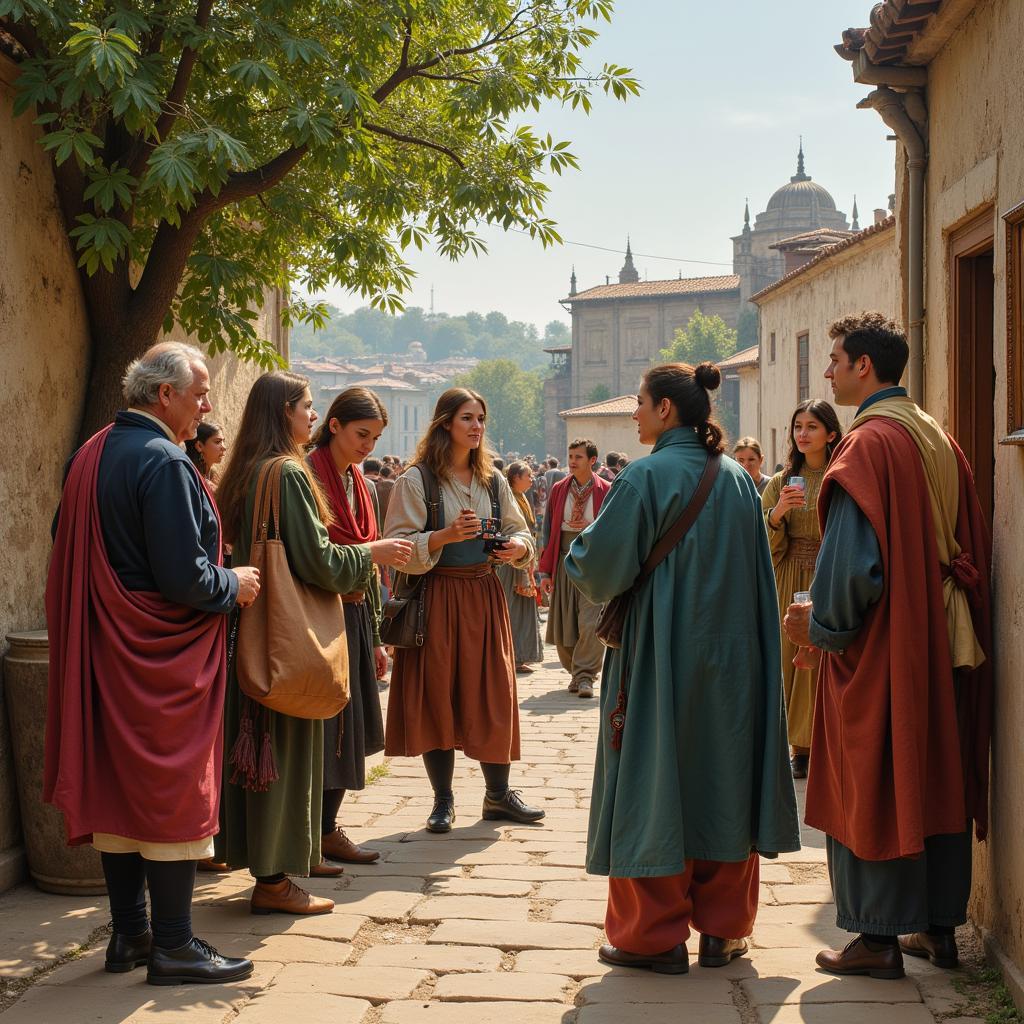The Dilettanti Society often evokes images of superficial engagement with the arts. However, a deeper exploration reveals a more nuanced understanding of its role, historically and in the modern context, especially regarding its potential to foster cross-cultural understanding and contribute to global peace. This article delves into the dilettanti society, examining its evolution and exploring how appreciation for arts and culture can bridge divides and contribute to a more harmonious world.
From Grand Tours to Global Citizens: The Evolution of the Dilettanti Society
The term “dilettanti society” originated in 18th-century England, referring to groups of wealthy individuals, often returning from “Grand Tours” of Europe, who shared a passion for classical art and culture. These societies were often exclusive, focused on collecting and discussing art, and sometimes even influencing artistic trends. While the term “dilettante” can carry a connotation of superficiality, these early societies played a significant role in preserving and promoting artistic heritage. Their interest in antiquities and classical art spurred archaeological expeditions and contributed to the development of museums and galleries.
The Dilettanti Society and Cross-Cultural Exchange: Then and Now
The early dilettanti societies, despite their limitations, engaged with cultures beyond their own. Their travels and studies exposed them to different artistic traditions and perspectives. Today, the concept of a “dilettanti society” can be reimagined in a more inclusive and globally connected world. Access to information and diverse cultural experiences is no longer limited to a privileged few. Anyone with an internet connection can become a “cultural explorer,” learning about different art forms, traditions, and perspectives. This widespread access to cultural knowledge has the potential to foster greater understanding and empathy between people from different backgrounds.
 Dilettanti Society Members on the Grand Tour Engaging in Cultural Exchange
Dilettanti Society Members on the Grand Tour Engaging in Cultural Exchange
The Role of Arts and Culture in Peacebuilding
Arts and culture play a vital role in building bridges between communities and promoting peace. Art can transcend language barriers, allowing people from different cultures to connect on an emotional level. Music, dance, visual arts, and storytelling can convey shared human experiences, fostering empathy and understanding.
Dilettanti Society Reimagined: Cultivating Empathy and Understanding
In today’s interconnected world, a reimagined dilettanti society could play a crucial role in fostering peace. By embracing a broader, more inclusive definition of cultural engagement, we can create spaces for dialogue, collaboration, and shared appreciation. This can involve supporting artists from marginalized communities, promoting cross-cultural artistic projects, and fostering educational initiatives that celebrate diversity.
How the “Dilettanti Spirit” Can Contribute to a More Peaceful World
The core of the “dilettanti spirit”—a genuine curiosity and appreciation for art and culture—can be a powerful force for positive change. By fostering a deeper understanding of different cultures, we can challenge stereotypes, break down prejudices, and build a more peaceful and inclusive world. The dilettanti society, in its modern interpretation, can be a platform for promoting cross-cultural dialogue and celebrating the rich tapestry of human experience.
Embracing Cultural Curiosity: A Path to Global Citizenship
Cultivating cultural curiosity is essential for developing global citizenship. By actively seeking out and engaging with different cultures, we broaden our perspectives and become more aware of our shared humanity. This can lead to greater empathy, tolerance, and a stronger commitment to building a more just and peaceful world.
Conclusion
The dilettanti society, while historically associated with privilege and exclusivity, can be reimagined as a powerful force for promoting peace and understanding in the 21st century. By embracing cultural curiosity and fostering cross-cultural dialogue, we can leverage the “dilettanti spirit” to build a more harmonious and interconnected world. The dilettanti society, in its modern form, represents a commitment to lifelong learning, cultural appreciation, and ultimately, global peace.
FAQ
- What is the modern interpretation of a dilettanti society?
- How can art and culture contribute to peacebuilding?
- What is the significance of cultural curiosity in a globalized world?
- How can we promote cross-cultural dialogue and understanding?
- What role can individuals play in fostering a more peaceful world?
- How can technology facilitate cultural exchange and understanding?
- What are some examples of successful cross-cultural artistic projects?
When you need support, please contact Phone Number: 02043854663, Email: [email protected] Or visit us at: Zone 34, Bac Giang, 260000, Vietnam. We have a 24/7 customer support team.